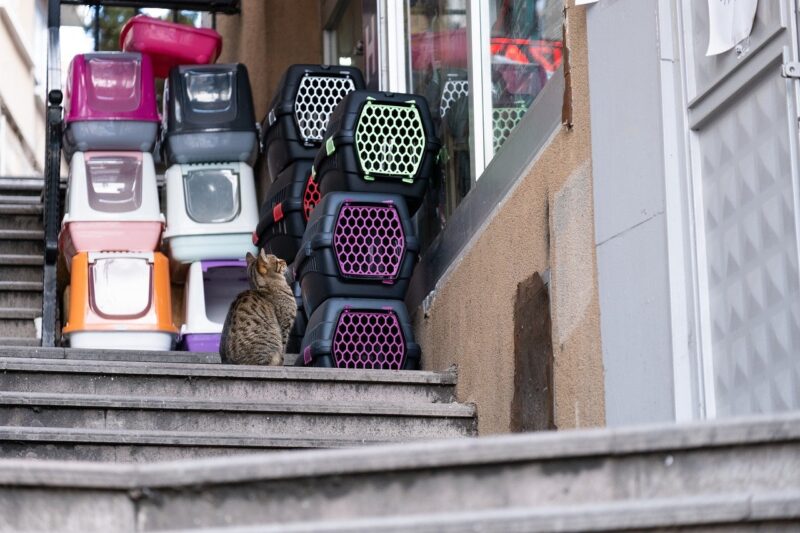Why Cats Love Boxes: The Evolutionary and Psychological Reasons Behind This Odd Obsession
November 13, 2024

Cats have long fascinated humans with their peculiar behaviors – none more so than their notorious obsession with boxes. You might find your cat spending hours entertaining itself in an ordinary cardboard box, and it begs the question: why do cats love boxes so much? In this article, we’ll dive deep into both the evolutionary and psychological reasons behind this endearing quirk of felines.
1. The Evolutionary Background: Safety and Security
The reasons behind a cat’s infatuation with boxes can be traced back to their evolutionary history. Domestic cats have ancestry that links them to wild cats, which operate on survival instincts. These instincts include finding safe spaces in which to hide from predators and stalk prey. Here’s how this plays out:
– Hiding from Threats: In the wild, a closed space provides protection. When a cat slips into a box, it offers a safe haven away from potential danger. The enclosed space makes them feel secure and gives them a vantage point to observe their surroundings.
– Hunting Ground: Boxes serve as excellent hiding spots for stalking. Cats are natural hunters, and a box can simulate the perfect ambush spot. When they sit stealthily inside, they can pounce on unsuspecting toys—or even human feet!
This instinctive behavior is particularly pronounced in kittens, who often learn these skills by playing pranks in confined spaces.
2. Psychological Comfort: Reducing Stress and Anxiety
Boxes not only provide physical safety but also psychological comfort. Research has shown that cats in stressful environments frequently seek small, enclosed spaces as a form of self-soothing. Here’s why this is essential for your feline friend:
– Stress Reduction: Studies indicate that when cats are given access to boxes, they experience lower anxiety levels. This is particularly significant when there are new changes in their environment, like moving to a new home or the arrival of a new baby.
– Containment and Security: The feeling of containment is key to a cat’s emotional well-being. In a box, they can regulate their exposure to the outside world, making them feel safe while allowing them to observe without being threatened.
This behavior is essential for their mental health and well-being, proving that it’s more than a mere instinct; it’s driven by the need for emotional security.
3. Playtime and Exploration: Curiosity at Work
Curiosity is perhaps one of the most defining traits of a cat. Their love for boxes also reflects their inquisitive nature. Let’s look at how this fascination aligns with their playful side:
– Natural Explorers: Cats are naturally curious animals, and any box offers a new environment to explore. From the scent of the cardboard to the peculiar acoustics inside, boxes engage their senses in unique ways.
– Interactive Play: To a cat, a box is more than just a contained space; it doubles as a toy. The contained nature transforms it into an exciting playground. Cats will often engage in playful budging of the box, scratching its edges, and even leaping in and out for fun.
Providing your cat with a box can stimulate their desire for exploration while encouraging them to engage in active play. This engagement is vital, as it keeps your cat mentally and physically stimulated.
4. A Multi-Purpose Space: Sleep and Retreat
For many cats, a box serves as a multi-purpose sanctuary. Here’s how a box can provide habitats for different activities:
– A Cozy Retreat: Beyond being a play area, boxes make sheltered spots perfect for napping. Cats love warm and dark places, and the confines of a box can provide the ideal environment to curl up and doze off.
– Personal Space: Even the most social cats need their quiet time. A box can offer a personal retreat where a cat can unwind away from any hustle or bustle. Cats are territorial; therefore, having a defined space can contribute to their sense of ownership and comfort.
– Temperature Regulation: Boxes can also help with temperature control in colder months. The confined space can provide warmth from your home’s heating, making it a preferred napping spot.
5. The Science Behind It: Researchers Weigh In
Several studies provide insights into why cats gravitate toward boxes. One notable piece of research published in the journal Applied Animal Behaviour Science found that shelter cats with access to boxes exhibited reduced stress compared to those without. Some significant points include:
– Box Therapy: Cats with access to boxes had lower levels of the stress hormone cortisol. This reinforces the idea that the presence of a box can greatly enhance a cat’s emotional well-being.
– Environmental Enrichment: Providing boxes in domestic settings can greatly enrich the living environment of cats, contributing positively to behavioral traits and overall health.
Understanding the psychology and biology of why cats love boxes can revolutionize how you create a pet-friendly environment in your home.
Conclusion: Embrace the Quirks
In conclusion, the love for boxes is an intricate blend of evolutionary instincts, psychological needs, and playful behavior. Boxes provide cats with safety, comfort, and stimulation, all essential elements contributing to their happiness.
As cat owners, acknowledging and catering to this endearing obsession can foster a stronger bond with your furry friend. So, the next time you notice your cat spending hours in a cardboard box, remember that it is much more than a simple container; it’s a sanctuary that reflects their history and psychology. By embracing their quirks, you improve their life and deepen your relationship with these delightful creatures.
Embrace the oddity of your cat’s box obsession and maybe even join them in a cozy corner – because let’s face it, who doesn’t love a good box?







